October 2024
Reminder: When Was the Last Time...?
The Evolution and Future of Foot Orthotics
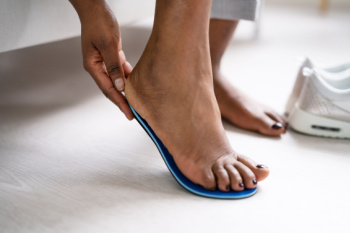
Foot orthotics have a long history, dating back to ancient civilizations, where early forms of arch support were crafted from natural materials like leather and wood. By the 20th century, modern orthotics evolved with a better understanding of foot biomechanics. In the 1960s, Dr. Merton Root introduced functional foot orthotics, which revolutionized the field by focusing on correcting foot motion to treat various conditions like flat feet, plantar fasciitis, and overpronation. Today, orthotics are highly customizable, made from advanced materials such as carbon fiber and EVA foam. They provide support, relieve pain, and improve mobility for patients with various foot problems. The future of foot orthotics looks promising, with advancements in 3D printing and digital foot scanning allowing for even more precise and personalized solutions. If you suffer from persistent foot pain, it is suggested that you schedule an appointment with a podiatrist for a proper diagnosis and treatment, which may include custom orthotics.
If you are having discomfort in your feet and would like to try orthotics, contact Naim G. Shaheed, DPM from Ankle and Foot Centers of Georgia. Our doctor can provide the care you need to keep you pain-free and on your feet.
What Are Orthotics?
Orthotics are inserts you can place into your shoes to help with a variety of foot problems such as flat feet or foot pain. Orthotics provide relief and comfort for minor foot and heel pain but can’t correct serious biomechanical problems in your feet.
Over-the-Counter Inserts
Orthotics come in a wide variety of over-the-counter inserts that are used to treat foot pain, heel pain, and minor problems. For example, arch supports can be inserted into your shoes to help correct overarched or flat feet, while gel insoles are often used because they provide comfort and relief from foot and heel pain by alleviating pressure.
Prescription Orthotics
If over-the-counter inserts don’t work for you or if you have a more severe foot concern, it is possible to have your podiatrist prescribe custom orthotics. These high-quality inserts are designed to treat problems such as abnormal motion, plantar fasciitis, and severe forms of heel pain. They can even be used to help patients suffering from diabetes by treating foot ulcers and painful calluses and are usually molded to your feet individually, which allows them to provide full support and comfort.
If you are experiencing minor to severe foot or heel pain, it’s recommended to speak with your podiatrist about the possibilities of using orthotics. A podiatrist can determine which type of orthotic is right for you and allow you to take the first steps towards being pain-free.
If you have any questions please contact one of our offices located in Lithonia/Stonecrest and Emory/Midtown, GA . We offer the newest diagnostic and treatment technologies for all your foot and ankle needs.
Biomechanics of the Ankle
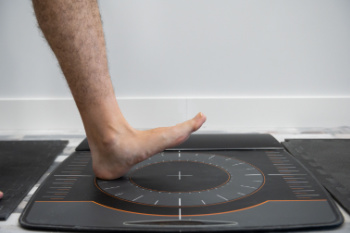
The ankle's movement and stability rely on bones, ligaments, and muscles working together. The main bones involved are the tibia, fibula, and talus. These form the ankle joint, which allows the foot to move up and down. Ligaments, like the deltoid, anterior talofibular, and calcaneofibular ligaments, help keep the ankle stable and control side-to-side movements. When we walk, the ankle flexes upwards when the heel touches the ground and pushes down as we lift the foot off. In cases of severe damage or arthritis, ankle replacement surgery may be needed, where the joint is replaced with artificial parts to restore movement. If you have ankle pain or discomfort, it is suggested that you schedule an appointment with a podiatrist who can diagnose the problem and recommend treatments to help you regain proper walking function and stability.
If you have any concerns about your feet, contact Naim G. Shaheed, DPM from Ankle and Foot Centers of Georgia. Our doctor can provide the care you need to keep you pain-free and on your feet.
Biomechanics in Podiatry
Podiatric biomechanics is a particular sector of specialty podiatry with licensed practitioners who are trained to diagnose and treat conditions affecting the foot, ankle and lower leg. Biomechanics deals with the forces that act against the body, causing an interference with the biological structures. It focuses on the movement of the ankle, the foot and the forces that interact with them.
A History of Biomechanics
- Biomechanics dates back to the BC era in Egypt where evidence of professional foot care has been recorded.
- In 1974, biomechanics gained a higher profile from the studies of Merton Root, who claimed that by changing or controlling the forces between the ankle and the foot, corrections or conditions could be implemented to gain strength and coordination in the area.
Modern technological improvements are based on past theories and therapeutic processes that provide a better understanding of podiatric concepts for biomechanics. Computers can provide accurate information about the forces and patterns of the feet and lower legs.
Understanding biomechanics of the feet can help improve and eliminate pain, stopping further stress to the foot.
If you have any questions please feel free to contact one of our offices located in Lithonia/Stonecrest and Emory/Midtown, GA . We offer the newest diagnostic and treatment technologies for all your foot and ankle needs.
Caring for Diabetic Feet
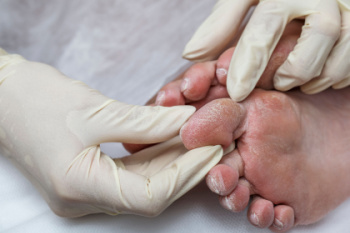
Diabetic foot care is essential for preventing serious complications like foot ulcers, infections, and even amputations. People with diabetes are at higher risk for foot problems due to poor circulation and nerve damage, which can lead to unnoticed injuries. Education on proper foot care is imperative to minimize these risks. Those with diabetes should inspect their feet daily for cuts, blisters, or signs of infection, and keep feet clean and dry. Properly fitting shoes and regular podiatrist visits are important for preventing pressure points and ulcers. Foot ulcers are open sores that can develop from small injuries, becoming serious if left untreated. They require immediate attention, as untreated ulcers can lead to severe infections and potential amputations. If you have diabetes, it is suggested that you have routine visits with a podiatrist to proactively prevent serious foot problems and to educate you on how to maintain healthier feet.
Diabetic foot care is important in preventing foot ailments such as ulcers. If you are suffering from diabetes or have any other concerns about your feet, contact Naim G. Shaheed, DPM from Ankle and Foot Centers of Georgia. Our doctor can provide the care you need to keep you pain-free and on your feet.
Diabetic Foot Care
Diabetes affects millions of people every year. The condition can damage blood vessels in many parts of the body, especially the feet. Because of this, taking care of your feet is essential if you have diabetes, and having a podiatrist help monitor your foot health is highly recommended.
The Importance of Caring for Your Feet
- Routinely inspect your feet for bruises or sores.
- Wear socks that fit your feet comfortably.
- Wear comfortable shoes that provide adequate support.
Patients with diabetes should have their doctor monitor their blood levels, as blood sugar levels play such a huge role in diabetic care. Monitoring these levels on a regular basis is highly advised.
It is always best to inform your healthcare professional of any concerns you may have regarding your feet, especially for diabetic patients. Early treatment and routine foot examinations are keys to maintaining proper health, especially because severe complications can arise if proper treatment is not applied.
If you have any questions please feel free to contact one of our offices located in Lithonia/Stonecrest and Emory/Midtown, GA . We offer the newest diagnostic and treatment technologies for all your foot and ankle needs.
Diagnosing Gout
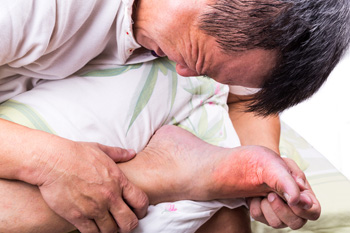
Gout is a form of arthritis characterized by sudden, severe pain, redness, and swelling, often in the big toe. It occurs when uric acid builds up in the blood, forming sharp crystals in the joints. Uric acid is a waste product that typically dissolves in the blood and is excreted through urine, but when levels are too high, it can accumulate and cause painful flare-ups. Gout can be triggered by consuming foods high in purines, such as red meat, shellfish, and alcohol, which increase uric acid levels. Risk factors include genetics, obesity, diabetes, high blood pressure, and certain medications. Diagnosis is typically made through a physical exam, blood tests to measure uric acid levels, and joint fluid analysis. If you have painful gout in your feet, it is suggested that you schedule an appointment with a podiatrist for guidance on how to find relief.
Gout is a foot condition that requires certain treatment and care. If you are seeking treatment, contact Naim G. Shaheed, DPM from Ankle and Foot Centers of Georgia. Our doctor will treat your foot and ankle needs.
What Is Gout?
Gout is a type of arthritis caused by a buildup of uric acid in the bloodstream. It often develops in the foot, especially the big toe area, although it can manifest in other parts of the body as well. Gout can make walking and standing very painful and is especially common in diabetics and the obese.
People typically get gout because of a poor diet. Genetic predisposition is also a factor. The children of parents who have had gout frequently have a chance of developing it themselves.
Gout can easily be identified by redness and inflammation of the big toe and the surrounding areas of the foot. Other symptoms include extreme fatigue, joint pain, and running high fevers. Sometimes corticosteroid drugs can be prescribed to treat gout, but the best way to combat this disease is to get more exercise and eat a better diet.
If you have any questions please feel free to contact one of our offices located in Lithonia/Stonecrest and Emory/Midtown, GA . We offer the newest diagnostic and treatment technologies for all your foot and ankle needs.
Gait and Balance Disorders in Seniors
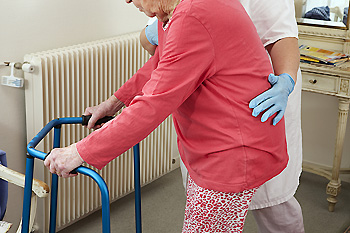
Gait and balance disorders are prevalent among the elderly, often leading to increased fall risk and decreased mobility. Falling can seriously impact the feet, and may cause pain, discomfort and difficulty in completing daily activities. These disorders can arise from various causes, including muscle weakness, joint stiffness, neurological conditions, and medications. Symptoms typically involve unsteady walking, difficulty maintaining balance, and frequent falls. Diagnosing these issues often involves the Timed Up and Go Test, where a person is timed as they rise from a chair, walk a short distance, and return to the chair. This test helps evaluate the individual's mobility, balance, and risk of falling. If you or someone you know has fallen without an obvious cause, it is suggested that you schedule an appointment with a podiatrist who can treat various foot conditions and determine the cause of falling.
Preventing falls among the elderly is very important. If you are older and have fallen or fear that you are prone to falling, consult with Naim G. Shaheed, DPM from Ankle and Foot Centers of Georgia. Our doctor will assess your condition and provide you with quality advice and care.
Every 11 seconds, an elderly American is being treated in an emergency room for a fall related injury. Falls are the leading cause of head and hip injuries for those 65 and older. Due to decreases in strength, balance, senses, and lack of awareness, elderly persons are very susceptible to falling. Thankfully, there are a number of things older persons can do to prevent falls.
How to Prevent Falls
Some effective methods that older persons can do to prevent falls include:
- Enrolling in strength and balance exercise program to increase balance and strength
- Periodically having your sight and hearing checked
- Discuss any medications you have with a doctor to see if it increases the risk of falling
- Clearing the house of falling hazards and installing devices like grab bars and railings
- Utilizing a walker or cane
- Wearing shoes that provide good support and cushioning
- Talking to family members about falling and increasing awareness
Falling can be a traumatic and embarrassing experience for elderly persons; this can make them less willing to leave the house, and less willing to talk to someone about their fears of falling. Doing such things, however, will increase the likelihood of tripping or losing one’s balance. Knowing the causes of falling and how to prevent them is the best way to mitigate the risk of serious injury.
If you have any questions, please feel free to contact one of our offices located in Lithonia/Stonecrest and Emory/Midtown, GA . We offer the newest diagnostic and treatment technologies for all your foot care needs.









